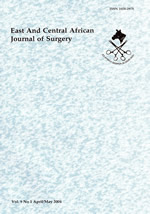
|
East and Central African Journal of Surgery
Association of Surgeons of East Africa and College of Surgeons of East Central and Southern Africa
ISSN: 1024-297X
EISSN: 1024-297X
Vol. 21, No. 3, 2016, pp. 143-145
|
 Bioline Code: js16065
Bioline Code: js16065
Full paper language: English
Document type: Research Article
Document available free of charge
|
|
|
East and Central African Journal of Surgery, Vol. 21, No. 3, 2016, pp. 143-145
| en |
Hidden Facts and the Role of Truthfulness in Academic Dishonesty
Musau, Pius
Abstract
Background: Academic dishonesty is widespread across the world and studies done have largely relied on self-reporting to establish the extent and factors contributing to the practice. This demands of researchers to take at face value what people who may not be entirely truthful are saying. It is not a surprise, therefore, that varied interesting findings have been made in different studies. This paper delves into the complexity of determining the key components of academic dishonesty and brings into focus the role of truthfulness in understanding the elicited data. The objective of this study was to establish the role of truthfulness in understanding various components of academic dishonesty.
Methods: This was a Cross sectional study using self-administered questionnaire. The Setting was the School of Medicine, Moi University, Eldoret - Kenya. The study subjects were 156 students in the clinical (4th, 5th and 6th) years of study. They anonymously filled a 20-item self-administered questionnaire. The questionnaire captured the demographic data and the views of the students on various aspects of academic dishonesty ranked in a Likert scale of six levels starting with strongly agree to strongly disagree.
Results: The overall level of truthfulness among these medical students was 55.8%. While more males had prior experience with academic dishonesty in secondary school and involvement at College, they were also more truthful than the females. The untruthful were 2.2 times as often involved in academic dishonesty as the truthful and were also less likely to report on their classmates.
Conclusion: There are hidden facts in academic dishonesty that can only be revealed by subjecting gathered data to a scrutiny on how truthful the respondents are. Truthfulness is an inversely proportional surrogate predictor of academic dishonesty.
Keywords
Role; Thruthfulness; academic; dishonesty
|
| |
© Copyright 2016 - East and Central African Journal of Surgery
|
|
